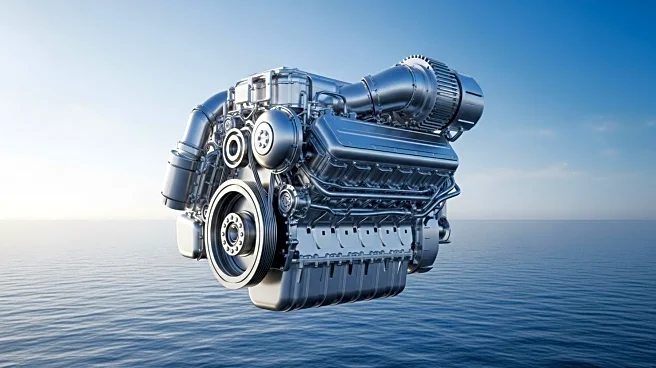What is the story about?
What's Happening?
Swiss marine power company WinGD has announced the upcoming release of the first ethanol-fueled two-stroke marine engine, set to hit the market in 2026. This development follows extensive research into ethanol as a viable marine fuel, including full-scale engine tests conducted in 2018. The new engine will be available for both newbuild and retrofit applications starting in 2027. It is based on the X DF-M methanol-fueled engine, which has already received positive feedback from initial users and class societies. The engine will feature an adapted control system and fuel injector nozzle arrangement to accommodate ethanol's higher energy density, requiring lower fuel volumes. WinGD's research into ethanol began in 2014, supported by the Swiss Federal Office of Energy, and continued with the EU-funded HERCULES 2 project. Ethanol, which can be produced renewably from biomass, is seen as a competitive alternative fuel in certain markets.
Why It's Important?
The introduction of an ethanol-fueled marine engine by WinGD represents a significant step towards decarbonization in the maritime industry. As global emission regulations become more stringent, the availability of lower carbon alternatives like ethanol is crucial for ship owners and operators seeking to reduce their environmental impact. Ethanol's potential for renewable production and competitive pricing in some markets makes it an attractive option for the shipping industry. This development could lead to increased adoption of ethanol as a marine fuel, contributing to the industry's overall sustainability goals. Additionally, WinGD's efforts to connect with key players in the ethanol value chain through the Global Ethanol Association may facilitate broader acceptance and integration of ethanol in maritime operations.
What's Next?
WinGD is currently in discussions with ship owners, ethanol fuel suppliers, and class societies regarding the first commercial applications of its ethanol engine. The company plans to confirm whether the engine will be optimized specifically for ethanol or designed to accommodate both methanol and ethanol. As the engine becomes commercially available, it is expected to influence the maritime industry's fuel choices, potentially leading to a shift towards more sustainable fuel options. The success of this engine could also encourage further research and development in alternative marine fuels, supporting the industry's transition to greener practices.
Beyond the Headlines
The development of ethanol-fueled marine engines highlights the broader trend of innovation in alternative fuels within the shipping industry. This shift not only addresses environmental concerns but also presents economic opportunities for regions with abundant biomass resources. The move towards ethanol and other alternative fuels may also prompt regulatory changes and new standards in maritime operations, influencing global shipping practices. As the industry adapts to these changes, stakeholders will need to consider the implications for supply chains, infrastructure, and investment in new technologies.
















